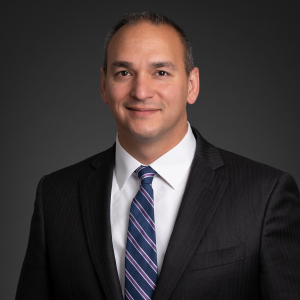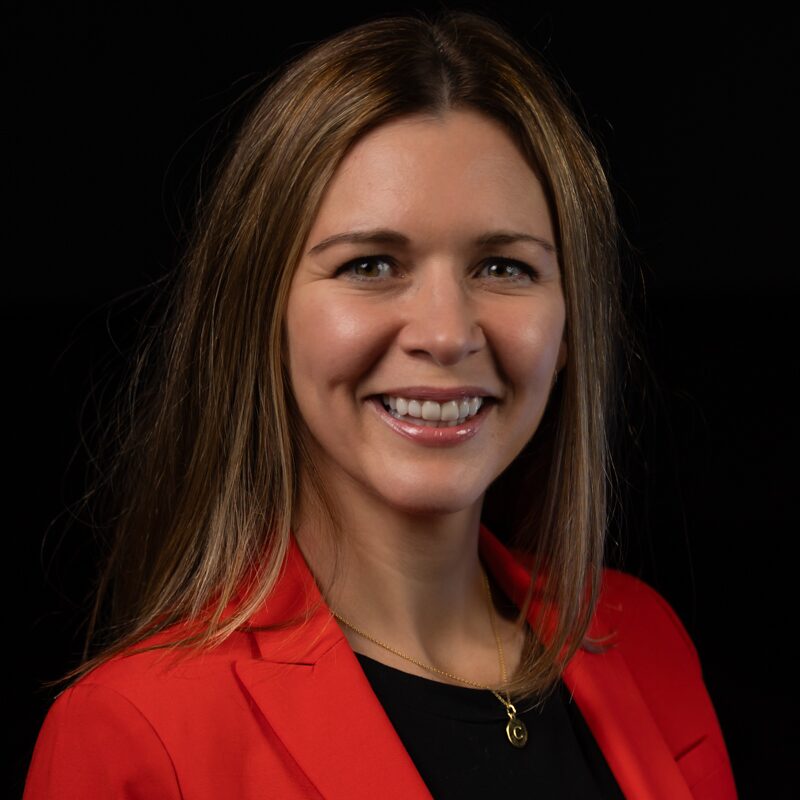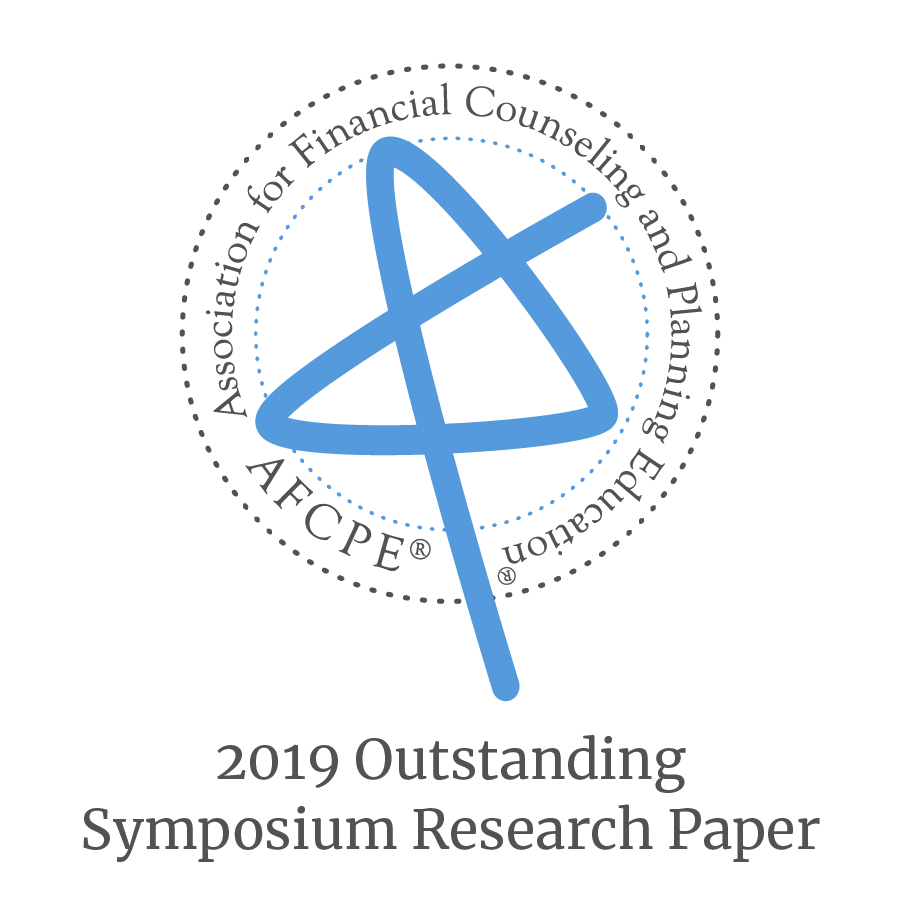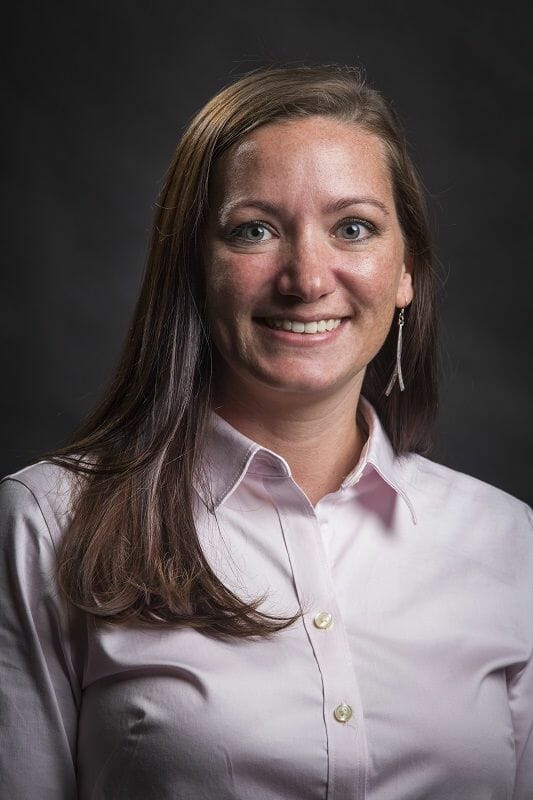Congratulations to past winners of the AFCPE Outstanding Symposium Research Paper!



2024: “Gambling Behavior and Cryptocurrency Investment: A Treatment-Effect Analysis”
This study investigates the relationship between gambling behavior and cryptocurrency investment. Data from the 2018 National Financial Capability Study (both the State-by-State Survey and the Investor Survey) were used to examine cryptocurrency investments among 1,450 investor-respondents. In addition to logistic regression, treatment-effect estimation techniques—including propensity score matching (PSM), augmented inverse-probability weighting (AIPW), and inverse-probability weighted regression adjustment (IPWRA)—are used to demonstrate a positive and significant relationship between gambling behavior and cryptocurrency investment.
Michael Kothakota, CEO, WolfBridge Wealth
Timothy Todd, Interim Dean and Professor of Law, Liberty University School of Law
Christina Lynn, Ph.D., CFP, AFC
, CDFA
, Practice Management Consultant, Mariner Wealth Advisors.


2023: “The Oldest Old’s Experiences of Financial Fraud and Exploitation: An Exploratory Panel Study”
Previous research has well-established the risk and protective factors contributing to older adults’ experiences of financial fraud victimhood. Gaps remain, however, on the presence of these factors as experienced by the aged 85+ demographic. Even less research has explored the conceptualization of financial fraud as a tertiary outcome for older people—one in which exploitation occurs, almost occurs but is avoided, or never occurs. In this session, MIT AgeLab researchers discussed a mixed methods study with a panel of ages 85 and older adults, which explored their experiences with financial fraud in the latest phase of life.
Attendees learned of the unique risk and protective factors contributing to a sample of the age 85+ demographic’s experiences with financial fraud, evaluated the degree to which these factors are similar or different from previously researched factors contributing to financial exploitation propensity among older adults, and discussed opportunities to intervene around the topic of financial fraud with the oldest of older adults, including considerations for resource brokering, awareness-raising and designing effective education materials.
Taylor Patskanick, Massachusetts Institute of Technology
Julie Miller, Director of Thought Leadership, Financial Resilience at AARP


2022: “Financial Inclusion through Mobile Fintech Tools: A Financial Literacy and Well-being Perspective”
This study used structural equation modeling techniques to test a conceptual framework of financial inclusion through the usage of mobile fintech. The findings of this study expand the current knowledge of mobile fintech by examining its antecedents of financial education and financial literacy and its outcomes, including financial behavior and financial well-being. Using data from the 2018 National Financial Capability Study, findings of this study suggest that receiving financial education can enhance financial literacy that is positively associated with the number of mobile fintech adopted. Furthermore, higher financial literacy is positively associated with engaging in desirable financial practices but is not significantly associated with the number of mobile fintech used. The unexpected negative association between mobile fintech adoption and desirable financial behavior raises concerns that the adoption of mobile financial services could be a double-edged sword. Implications for consumers, financial practitioners, and policymakers are discussed.
Dr. Lu Fan & Yu Zhang, University of Georgia
2021: “The Role of Financial Advice in Promoting College Savings Among Households”
This study examines the effects of five varying categories of financial advice and their relationship with college-saving decisions using the 2009 and 2012 waves of the Financial Industry Regulatory Authority’s (FINRA) National Financial Capability Study. After controlling for self-selection bias, the finding suggests that receiving financial advice related to savings/investments, insurance, or tax planning increases the likelihood of saving for children’s college education. Other findings suggest the lack of statistically significant relationships between college savings and debt counseling or loan advice. The robust discussion highlights that policies incentivizing households to seek financial advice could promote college savings and assist in the reduction of student loan dependence.
Thomas Korankye, PhD, CFP® and Blain Pearson, PhD, CFP®.
2020: “Consumer Experience of Mistreatment and Fraud in Financial Services: Implications from Integrative Consumer Vulnerability Framework”
This study utilizes the National Financial Well-Being Survey (NFWS) from the Consumer Financial Protection Bureau (CFPB) to investigate the profiles of consumers who experience mistreatment or fraud in financial services. An integrative consumer vulnerability framework was used as the theoretical framework to examine how disadvantaged consumer characteristics and vulnerable consumer characteristics are associated with mistreatment and fraud experience. Consumers in vulnerable states, due to low financial capability, cognitive decline, negative financial and life events, and more exposure to various financial services, were more likely to report experiencing mistreatment and fraud. Consumers from higher socio-economic status were more likely to have been victims to fraud. These findings offer implications for consumer education and consumer policy.
Han Na Lim, PhD, CFP® is an assistant professor in Personal Financial Planning program at Kansas State University. She teaches insurance planning to undergraduate students and theory class to the doctoral students.
2019: “The Relationship Between Cognitive Abilities and Financial Help-Seeking Behavior”
This study uses the 2017 National Financial Well-Being Survey to investigate the relationship between cognitive abilities and financial help-seeking behavior. Findings provide practical implications for financial professionals, institutions, employers, and policymakers.
Lu Fan, PhD, CFP® is an Assistant Professor in the Department of Personal Financial Planning at the University of Missouri.
Han Na Lim, PhD, CFP® is an Assistant Professor of Family Studies and Human Services at Kansas State University.
2018: “Theory of Planned Behavior & Retirement Preparation”
The need for workers to prepare for retirement has been widely promoted, yet our understanding of workers’ retirement preparation behavior remains sparse. This paper reports the findings of a study of non-retired workers utilizing the 2015 National Financial Capability Study and their intention to have any other retirement accounts (IRA, Keogh, myIRA) not through the employer. Utilizing the theory of planned behavior, the study reveals respondent’s self-reported attitudes, subjective norms and perceived behavioral control account for a high proportion of the variance in the behavioral intention to calculate required retirement savings. In turn, the behavioral intention accounts for a high proportion of the variance in the behavior to have any other retirement accounts not through the employer. This study highlights the relevance of psychological constructs to an understanding of workers’ retirement preparation behavior, and establishes a need to for financial counselors, advisors and other practitioners to understand the psychological determinants of retirement preparation behaviors.
Dr. Han Na Lim earned her BS and MS in Consumer Science from Seoul National University and her PhD in Family Resource Management from the Ohio State University. After she received her degree, she worked as a senior researcher at Samsung Life Insurance in Seoul, South Korea. Recently, she joined to Kansas State University as an assistant professor in Personal Financial Planning. She will be teaching courses in both the B.S. and Ph.D. programs.
Dr. Lim’s research areas include college students’ financial wellness and the effects of family relationship on financial behaviors. Her research has been published in Journal of College Student Retention: Research, Theory, & Practice, Journal of Financial Counseling and Planning, and Journal of Financial Therapy.
Frank Magwegwe is an entrepreneur based in South Africa and doctoral student at Kansas State University. His research interests include financial wellness, social comparisons and retirement preparedness. Frank is the founder and managing director of Thrive Financial Wellness, a provider of independent and unbiased workplace financial education in South Africa.
2017: “Budgeting and Financial Capability: A Perspective of Behavioral Hierarchy”
Dr. Barbara O’Neill is a Distinguished Professor at the Rutgers School of Environmental and Biological Sciences, and is Rutgers Cooperative Extension’s Extension Specialist in Financial Resource Management. From August 1978 to June 2004, she was Family and Consumer Sciences Educator in Sussex County, N.J. and taught over 1,100 classes and speaking engagements to over 24,000 adult learners. She is also project director for the national Cooperative Extension basic investing program, Investing for Your Future. Dr. O’Neill is a prolific writer and has written over 1,500 consumer newspaper articles and over 100 articles for academic journals, conference proceedings, and other professional publications. She is a certified financial planner (CFP®), chartered retirement planning counselor (CRPC®), accredited financial counselor (AFC®), certified housing counselor (CHC®), and certified in family and consumer sciences (CFCS®). Dr. O’Neill has held various leadership roles in state and national professional associations and served as president of the Association for Financial Counseling and Planning Education (AFCPE®) in 2003. She is the author of two trade books, Saving on a Shoestring and Investing on a Shoestring, and co-author of Money Talk: A Financial Guide for Women. She has also written three financial case study textbooks, an online Guidebook to Help Late Savers Prepare for Retirement, and six book chapters. Dr. O’Neill received her Ph.D. in family financial management in 1995 from Virginia Tech and holds a master’s degree in consumer economics from Cornell University and a B.S. in home economics education from the State University of New York at Oneonta.
Dr. Jing Jian Xiao is Professor of Family Finance in the Department of Human Development and Family Studies at University of Rhode Island, teaching courses and conducting research in consumer economics and personal finance. He edited and contributed to books such as The Mathematics of Personal Finance and Handbook of Consumer Financial Research. He is the editor-and-chief of Journal of Financial Counseling and Planning, the official research journal of Association for Financial Counseling and Planning Education. He is also editing a book series entitled International Series on Consumer Science. He served as the president of American Council on Consumer Interests, president of Asian Consumer and Family Economics Association, a board member of National Consumer League, among others. He served as consultant and guest speaker for several financial literacy projects sponsored by the US Department of Treasury and National Endowment for Financial Education. He has been invited to give guest lectures on consumer financial behavior research in China, Japan, South Korea, Taiwan, and other countries/areas. He received his PhD in consumer economics from Oregon State University and MS and BS in economics from Zhongnan University of Economics and Law.
2016: “Examining the Community of Inquiry (COI) Model for Guiding Online Learning Related to Personal Finance”
Sandra J. Huston, PhD is an associate professor and director of the Personal Finance program in the department of Personal Financial Planning at Texas Tech University. Dr. Huston is an online education consultant for WebEd Consulting and also consults for The Financial Literacy Group in Washington, DC. She received a PhD in consumer economics from the University of Missouri-Columbia. Dr. Huston’s research interests focus on human capital specifically related to personal finance (financial literacy) and the financial planning process, household use of financial advice, and the impact of financial sophistication on resource allocation within household portfolios. Dr. Huston was the 2013 recipient of the Chancellor’s Council Distinguished Research Award and the 2014 & 2015 winner of the AFCPE® Outstanding Symposium Paper Award. She is currently developing her financial health model to illustrate how both functional finance (financial literacy) and perceptual finance impact our financial health. Dr. Huston also leads the AFCPE® Research Task Force.
Dawn Abbott, MS is currently an instructor for the Personal Finance Program within the Personal Financial Planning Department at Texas Tech University and is an online education consultant for WebEd Consulting. She served as the Assistant Director of the Personal Finance Program from 2013 to 2016. Dawn has extensive knowledge in online/traditional course design and online teaching techniques. Dawn’s research focuses on the effectiveness and impact of online education, specifically in relation to Personal Finance education. She is an active member of the Association for Financial Counseling and Planning Education® and is an Accredited Financial Counselor®. Dawn is currently the chair of the AFCPE® Financial Task Force and serves as a member of the AFCPE® Research Task Force.
2015: “Financial Sophistication and the Credit Card Puzzle”
Sandra J. Huston, PhD is an associate professor and director of the Personal Finance program in the department of Personal Financial Planning at Texas Tech University. She received a Ph.D. in consumer economics from the University of Missouri-Columbia. Dr. Huston’s research interests focus on human capital specifically related to personal finance and the financial planning process including financial literacy, household use of financial advice, and the impact of financial sophistication on resource allocation within household portfolios. Dr. Huston was the 2013 recipient of the Chancellor’s Council Distinguished Research Award and a 2014 AFCPE® Outstanding Symposium Paper Award winner. She is currently developing her financial health model with a particular emphasis on how student financial health is addressed on college campuses.
Laura C. Ricaldi is an assistant professor in the Personal Financial Planning Program in the Woodbury School of Business at Utah Valley University. She received a Ph.D. in Personal Financial Planning and a MBA in Management from Texas Tech University. Dr. Ricaldi currently teaches several financial planning courses including introduction to the PFP profession, risk management and insurance, and the financial planning capstone course. Her research interests include credit card use, debit card use, financial literacy, gender issues and generational cohorts. She enjoys working on financial planning research that directly impacts financial planning practitioners as well as extending the applications to the community in Utah.
Comments are closed.










